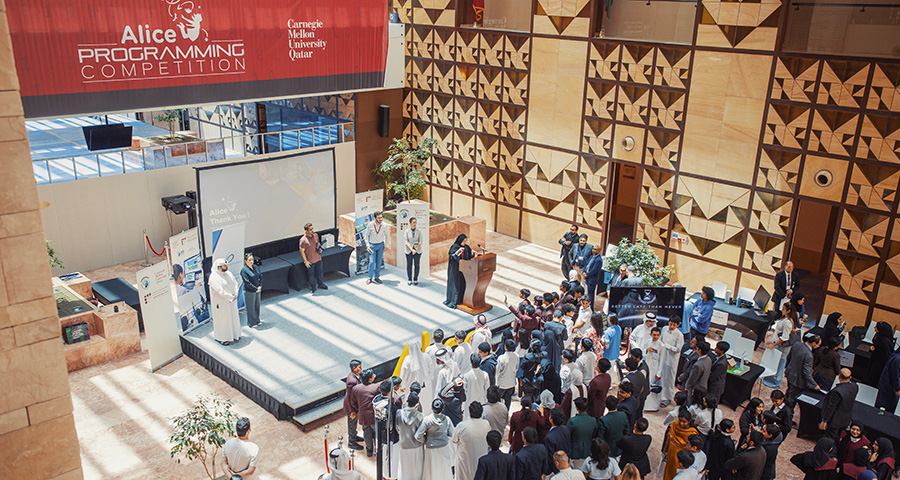
Programming contest at Carnegie Mellon inspires Qatar students to code
Hamad Bin Jassim Center (HBJ) for K-12 Computer Science at CMU-Q hosts ninth annual Alice Middle East Programming Competition
The ninth annual Alice Middle East Programming Competition, hosted by Carnegie Mellon University in Qatar (CMU-Q), inspired hundreds of students from across Qatar to create games and animations through computer programming. This year, 115 student teams from 50 schools submitted unique projects in the theme categories of cybersecurity, sustainability, crisis management, health and wellness, and entrepreneurship.
The competition challenges students who have learned programming through the Alice educational software to create an animation or game. Programming using Alice is a curriculum component of the information and communication technology (ICT) courses taught by Qatar’s Ministry of Education and Higher Education schools. Several private schools in Qatar also include Alice in their ICT coursework.
Teams submit their projects, and they are shortlisted based on creativity and complexity. The finalists showcase their work at CMU-Q, and judges determine the winners in beginner and advanced categories.
The importance of computer science education
As technology continues to redefine the way people live and work, learning computational fundamentals is essential for pre-college students.
Khaled Harras is the senior associate dean for faculty and a teaching professor of computer science at CMU-Q. He is also the director of the Hamad Bin Jassim Center for K-12 Computer Science Education, a partnership between CMU-Q and the Jassim and Hamad Bin Jassim Charitable Foundation. The HBJ Center promotes computer literacy among pre-college students in Qatar through an Alice component in the national curriculum, as well as a suite of workshops called MindCraft.
“We are very pleased with how many student teams submitted projects to the competition this year,” said Harras. “Computer science has become an integral part of nearly every field, and I believe that every student should have a foundation in computing, regardless of what careers they ultimately pursue.”
Managing Director of the Jassim and Hamad Bin Jassim Charitable Foundation said: Saeed Mudhkar Al Hajri said: “The Foundation, through the Hamad Bin Jassim Center for Computer Science Education, shows its firm commitment to encourage students in the country, and urge them to learn computing skills, and master the use of the tools they need in the future supporting the country’s transformation towards a knowledge economy.”
“Our long-term partnership with Carnegie Mellon University in Qatar has helped teach the basics of computing to thousands of students in Qatar, and we hope to attract even more students in the coming years.”
The event prizes were sponsored by AbuIssa Holding, a long-time supporter of educational initiatives at CMU-Q. Ashraf Abu Issa, chairman and CEO of AbuIssa Holding, stated: “Competitions like the Alice Programming Competition introduce students to the world of computing, and it is my hope that they will be inspired to learn even more. The global landscape is shaped by technology, and it is my honor to have a part in encouraging the next generation of innovators.”
Winning Schools
The top team in the advanced category was from Khalid Bin Ahmad Preparatory School for Boys, and in the beginner’s category from Awfaz Global School. Second and third-place teams, as well as the advanced runners-up, included students from Birla Public School and Mesaieed International School. The advanced runners-up list also included one team from Hamza Preparatory School for Boys.
About Alice Middle East
The Alice software was originally developed by researchers at Carnegie Mellon’s main campus to help children learn the basic concepts of computing using graphics and animation. In 2008, Her Highness Sheikha Moza Bint Nasser expressed an interest in bringing Alice to Qatar. Through a grant to CMU-Q from the Qatar National Research Fund (QNRF), a team of researchers localized Alice to the Middle East context and created a curriculum in Arabic and English.
In 2018, the Qatar Ministry of Education and Higher Education incorporated Alice Middle East into the Information Communication Technology (ICT) curriculum for Qatar government schools. Today, Alice is taught to more than 5000 students per year in Qatar.
